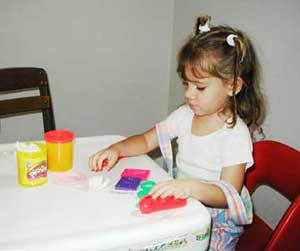Normal Physical Development Sequences
When Should a Parent Refer a child to Physical Therapy?
 There are certain sequences that are used to gauge whether a child is developing on schedule. The issues below are signals that a parent may need to bring the child to a physical therapy professional.
There are certain sequences that are used to gauge whether a child is developing on schedule. The issues below are signals that a parent may need to bring the child to a physical therapy professional.
Birth to 2 months:
- Doesn’t lift head in prone position (while lying on their stomach)
- Does not turn head to one side in prone position
- Does not turn head to both sides in supine position (lying on back)
3 Months:
- Does not hold head up 90 degrees in prone (lying on stomach)
- Does not extend both legs or kick reciprocally
- Does not roll to back when placed on their side
4 Months:
- Does not place weight on forearms in prone position
- Does not rotate or extend head
- Is unable to grasp a rattle
- Cannot bring both hands together
5 Months:
- Does not roll over one way
- Does not hold head up when pulled to sitting
- Is unable to hold head steady in supported sitting position
- Does not bear weight on legs
6 Months:
- Is unable to keep head level with body when pulled to a sitting position
- Does not demonstrate balance reactions
- Cannot bear weight on hands in prone position
- Does not move head actively in supported sitting position
7 Months:
- Does not roll over either way
- Does not bear weight on legs
- Cannot lift head or assist when pulled to sitting position
- Demonstrates little balance reactions or protective extension of arms
8 Months:
- Does not roll over both ways
- Cannot sit with little or no support
- Does not hold weight on one hand while in the prone position
- Cannot bear weight on legs and bounce
10 Months:
- Cannot get to sitting position without assistance
- Does not assume crawling position (hand-knee position)
- Does not show interest/motivation to crawl
- Cannot sit on own without hand support
1 year:
- Does not pull to stand using furniture
- Cannot switch positions from sitting to prone
- Does not creep on hands and knees
- Cannot pivot while in sit position to retrieve toy
- Cannot pass an object from one hand to the other
- Cannot stand holding on to someone or something
- Cannot pick up small object
15 Months:
- Does not walk with one hand held
- Cannot stand alone well
- Does not demonstrate balance reaction while in the kneeling position
- Does not walk alone one to two steps
- Does not demonstrate motor planning by climbing on furniture
- Has a hard time picking up small objects
18 Months:
- Does not attempt to creep upstairs
- Does not walk without support
- Cannot throw ball
- Does not bend down to retrieve objects
- Does not demonstrate balance reaction in standing
 24 Months:
24 Months:
- Does not run
- Cannot walk upstairs with one hand held
- Cannot carry large toy while walking
- Does not squat in play
- Cannot retrieve toy off of floor from standing position
- Does not climb onto furniture, turn and sit
- Cannot build tower of 6 blocks
- Does not use utensils well
30 Months:
- Does not jump in place with both feet
- Does not stand from sitting by rolling on side
- Cannot catch large ball
- Has difficulty with gait and balance
- Does not walk downstairs using rail for support
- Does not have wide range of movement
- Does not run and stop without holding
- Does not avoid objects when running
36 Months:
- Cannot kick stationary ball
- Is not able to stand on one foot for 2 seconds
- Cannot build tower of 9 blocks
- Cannot complete 5-6 piece puzzle
- Is not using utensils properly
- Does not attempt to ride tricycle
- Does not demonstrate grasp of crayon
HCEI dba Karen A. Fay Physical Therapy Services
We provide physical therapy services to individuals from infant to adult. If you think you know of an individual may qualify for our services, or if you’re just not sure, see How to Obtain Services. Alternatively, you may visit our Physical Therapy Services page for more information.
Do you have more questions?
Call 928-776-9285, or email us using the form below.
